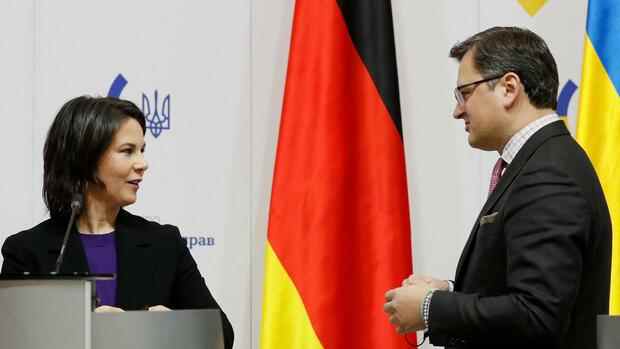Kiev The discussion about arms aid for Ukraine overshadowed the visit of Federal Foreign Minister Annalena Baerbock (Bündnis 90/Die Grünen) to Kiev this Monday. When she made her inaugural visit to Kiev in mid-January, she had already annoyed many Ukrainians on the subject. She refused “because of our historical responsibility” for Germany to supply arms to Ukraine – while the country is under military threat from Russia.
The chancellor’s recently clear words not to supply lethal weapons to Ukraine also had an effect in Kiev. Ukrainian Foreign Minister Dmytro Kuleba stopped raising the issue in front of the press after his meeting with Baerbock. Germany and Ukraine have “different positions on some issues,” said Kuleba.
Diplomacy isn’t about the things Germany can’t do, but about what it can do, he explained. Baerbock then drove to a military hospital in Kiev, which was modernized with German help. There, severely wounded Ukrainian soldiers are stabilized in such a way that they can be flown out to Bundeswehr hospitals.
Germany stands “without ifs and buts for the sovereignty and territorial integrity of Ukraine,” said Baerbock. Still, Germany will not comply with Ukraine’s request for supplies of night vision goggles, anti-drone guns and other defense weapons.
Top jobs of the day
Find the best jobs now and
be notified by email.
Meanwhile, the United States has already delivered more than 650 million tons of ammunition to Ukraine. Ukrainian soldiers are already being trained on British, man-portable NLAW anti-tank weapons. The Baltic states, the Netherlands, the Czech Republic and other NATO states are supplying defensive weapons to the country under pressure from Russia.
Baerbock is confronted with Ukrainian history
At the start of her second visit to Ukraine, Baerbock was shown to the Holodomor memorial. Holodomor is killing by starvation – a great trauma of Ukraine. At the end of the 1920s, the Soviet dictator Josef Stalin wanted to create communist agriculture by means of forced collectivization and the killing of large farmers known as “kulaks”.
Large parts of the wheat harvest from the Ukraine, the so-called granary of the Soviet Union, were also sold abroad. As a result, up to seven million Ukrainians starved to death. To this day, Kiev is trying to get this internationally recognized as genocide, but this is controversial.
The Federal Foreign Minister lit a small, beeswax-yellow candle in a vessel filled with wheat grains at the Holodomor memorial: “This is our commemoration of the Holodomor, killing by starvation,” explained Ukrainian Foreign Minister Dmytro Kuleba to her.
Then he talks about his grandmother Hanna, who died at the age of 87. She barely survived the famine. “She hasn’t left a single bite of food since, she was so keen on the memory of being very hungry,” Kuleba recalls.
In the memorial for the Holodomor they commemorated the victims of the famine at the beginning of the 20th century.
(Photo: imago images/photothek)
“They took everything from us, our food, our land, our language, our statehood.” They – this is the Moscow leadership that initially brought Ukraine into the Russian Empire, which existed until 1917. To this day, Russian President Vladimir Putin maintains that Ukraine is not a separate state and that “Russians and Ukrainians are one people”.
“Let’s not let Ukraine disappear from the map”
The second major trauma of Ukrainians is the Nazi attack on the Soviet Union, the occupation of Ukraine and Belarus. Hundreds of thousands of Ukrainian Jews were taken to camps and killed. Eight million Ukrainians died at the hands of the Wehrmacht and Gestapo. “Ukrainians should be at the center of a project of colonization and enslavement,” says famous historian Timothy Snyder of Adolf Hitler’s Eastern plans. He cannot understand why Germany often exercises its historical responsibility towards Russia alone.
The “terrible reminder from history,” said Baerbock to Kuleba, is that her generation is now “doing everything to ensure that such terrible crimes against humanity are never repeated.” Europe “does not look away, we stand with Ukraine”. How exactly, however, she did not say.
>> Read here: Europe’s battle for gas: Russia has the upper hand – for now
When she took office, Baerbock announced a new German foreign policy that “doesn’t sugarcoat conflicts or keep them silent.” “Eloquent silence” has “no longer any place” in German diplomacy.
But with her reference to Germany’s past as an argument against arms deliveries to Ukraine, she not only drew criticism in Ukraine. “Germany always uses history as an excuse when it’s appropriate,” said the American-Polish historian Anne Applebaum on the ARD talk show “Anne Will” the day before Baerbock’s visit to Kiev. She added: “I don’t understand which part of the story she means.” Because “even after a German invasion, Ukraine should be eradicated. Let’s not let Ukraine disappear from the map again. This must not happen a second time.”
The director of the Holodomor Museum in Kiev said similar words when she explained to the German minister the meaning of a small golden bird trapped in a rusty iron cross: “Ukraine was trapped, but they always wanted out.”
More: Military action and cyber attacks: Experts warn of Russia’s double strike
